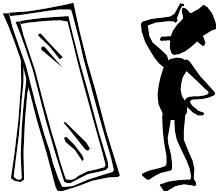This article offers additional advice on making your resume relevant and showing you have the skills and qualifications the job description specifies. For example, you could document and store your early career details for future use. Remember that your resume should reflect your current career status and potential. It needs to be forward-looking and relevant.
Resumes - Relevant, not Reflective
Earlier, I wrote about having resumes that were targeted to specific needs. The analogy was a resume wardrobe where you selected elements from your wardrobe that were relevant to the specific job requirements. Let's keep building on this idea and look carefully at the role of the complete wardrobe itself…the collection of all of your past work experiences.

I cannot count the number of times I have seen resumes that were choked with irrelevant job details that reached back before the discovery of sliced bread. We all have those favorite jeans hanging in the closet that we wore in high school or the lucky sports coat that we bought when we went on our first job interview 25 years ago. And it is OK to keep them in your resume wardrobe…but let's not wear them out in public! Your resume must be current, relevant, and targeted – not just reflective of your past.
Here are a few of my favorite historical findings on resumes I have dealt with:
- There was someone with 25 years of experience in the banking industry who listed their part-time job selling clothes at Macy's while in college. (Too far back and not relevant.)
- Or the person who listed their first job as an administrative assistant even though they had many years of experience in sales and marketing. They were applying for a mid-level management role. (A detractor that only raises competence questions.)
- The recent college graduate with a degree in international studies listed all the part-time jobs held at burger joints and gas stations during four years of college but did not list the honors achieved in high school, such as Student Council, high GPA, and Honors Society. (Until you get that first real job after college, high school successes still count!)
- Or me, on one of my early resumes, listing my part-time job as a lifeguard at the local swimming pool during my senior year of high school. (This is ancient history and has nothing to do with my current project management career.)
However, just because I am not using all my older job information on my resume now does not mean I will not ever use any of it. For example, if I am applying for a job that requires me to provide evidence that I can swim (for example, a job on a cruise ship), then listing my lifeguard role on my resume is appropriate for that job, but it is not necessarily relevant when applying to any other jobs.
Still, having this unpublished detail available in my resume wardrobe allows me to present it as needed – maybe as part of the discussions during an interview or even placing it on a cover letter to add value to the screening process. So maintain a listing of every job, every role, every unique task…but keep them in your resume closet and only pull them out when truly needed.
Bottom Line
Do not throw out those early career details – they might serve a special need sometime in the future. Keep them well documented, but keep them off your current resume unless there is a unique goal they can serve.
Source: C.J. Trayser This work is licensed under a Creative Commons Attribution-NonCommercial-NoDerivatives 3.0 License.
This work is licensed under a Creative Commons Attribution-NonCommercial-NoDerivatives 3.0 License.